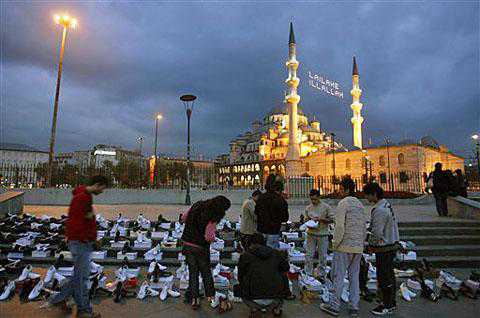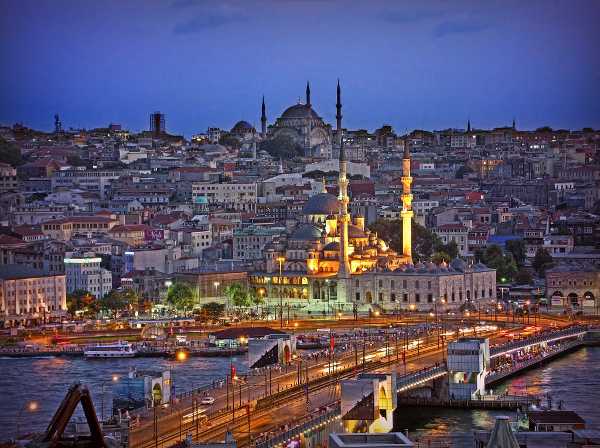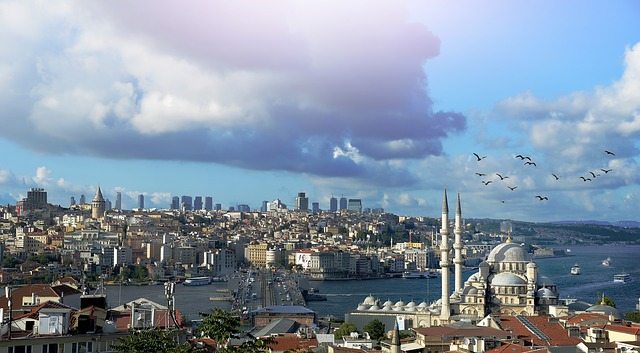Dorian Jones | Istanbul, Turkey

Local authorities in Istanbul have been seizing outdoor tables at local bars and cafes while customers are still eating and drinking in one city’s most popular entertainment districts. Though officials claim the diners were removed because they were obstructing street traffic, some suspect a wave of conservatism has washed over the city days before the Muslim world begins celebrating Ramadan.
Hundreds of restaurant and bar workers and owners marched through the center of Istanbul to protest the crackdown on drinking and eating outside. One restaurant owner expressed his anger.
“We were 10 people working in this restaurant. Now seven or eight will be laid off,” he said. “We don’t know if we can even pay the rent or the utility bills. We may have to shut down completely.”
The controversy erupted earlier this week when dozens of officials descended on the Asmalimescit area of the city and seized tables and chairs outside cafes and bars while customers were eating and drinking.
Even though the owners paid for the right to use the streets, authorities declared they were causing an obstruction to pedestrians and cars.
In the past, the Asmalimescit area was home to the city’s once large Greek and Armenian minorities, and for centuries has been a favorite place to eat and drink, while listening to traditional street music.
In the past decade it has undergone a revival and is now a trendy place to party for both locals and tourists.
According to media reports earlier this week, Prime Minister Recep Tayyip Erdogan passed the neighborhood in a car and was shocked. He asked the city’s mayor to act.
That suspicion is shared by some, who now have to drink indoors at the height of summer.
“It’s silly, it’s stupid. Everybody loves it here, to drink outside and they killed our culture to drink here,” said one person interviewed. “Nobody comes here nowadays, the bars and cafes are closed. You know our government has some religious sensitivity and I think it’s because of this.”
One woman supports the official reason given for the ban – but also suspects religious motives are involved.
“I thought I was against it the first time I heard about it. But now it’s ok,” she said. “I guess it’s better that we can walk better. But there is a connection that it, is for the coming the Ramazan as well.”
Ramadan – or as it’s called in Turkey, Ramazan – starts next week and is the Muslim month of fasting. It’s always a time of tension in Turkey between the pious and secular communities.
A recent survey conducted by The World Values Survey, shows a rise in conservative beliefs during the fasting season. Of those polled, 44 percent said restaurants should be closed during fasting periods in Ramadan, a belief held by 39 percent in the 2007 poll.
At Istanbul’s Spice Market, just a short walk from the city’s entertainment district, people are stocking up on traditional foods like dates and olives, traditionally eaten at Iftar meal that breaks the day of fasting during Ramadan.
Speaking to people, there is a mood of both pragmatism and fortitude with this year’s fasting in traditionally the hottest month of the year.
One man said he is undecided. He said he will fast, but it depends on the weather. He said his working hours are very long, so he has to think accordingly.
“The days are longer now and the weather is hot. Till noon it is okay, but afternoon is difficult. Hunger is not problem, but thirst is the hard part,” he said.
Another man said such hardship can only bring him only to God.
“May God give us our strength to help our fasting,” he said. “Even though the days are longer and the weather is hot, fasting will be good for us.”
Turkey is preparing itself for a long and difficult month, with the country in the grips of a heat wave. But for the thousands of restaurant and bar workers in Istanbul set to lose their jobs, there is a strong feeling that in this year’s Ramadan, they are paying for the religious sensitivities of others.
via Istanbul Cracks Down on Outdoor Eating, Drinking | Europe | English VOA





